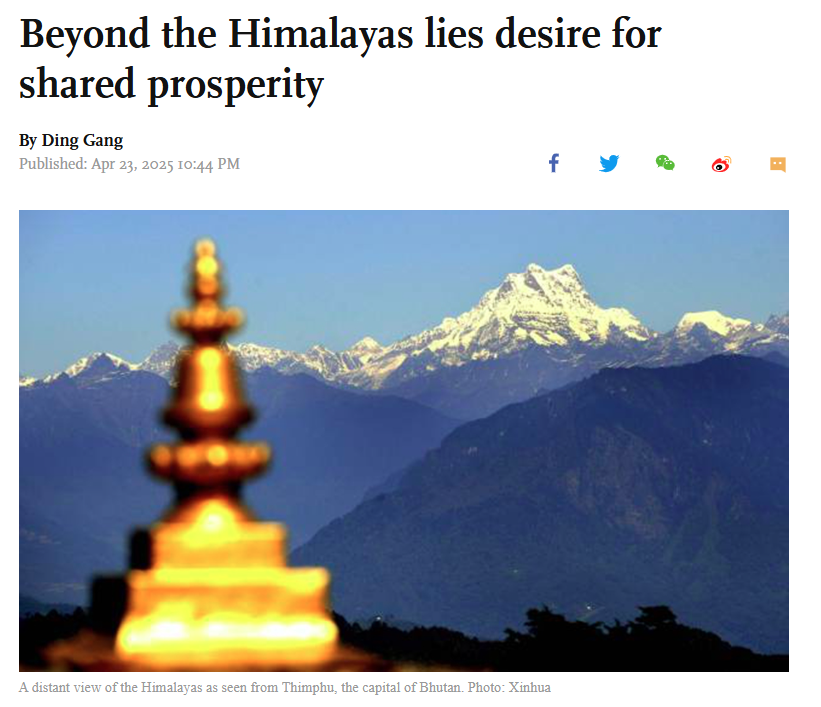LATEST INSIGHTS
Your Present Location: LATEST INSIGHTSDing Gang: Beyond the Himalayas lies desire for shared prosperity
Source: Global Times Published: 2025-04-23

By Ding Gang
Senior Editor with People's Daily
Senior Fellow of Chongyang Institute for Financial Studies at Renmin University of China (RDCY)
For centuries, the Himalayan Mountain range had stood like a towering backbone, separating China from South Asia and impeding the flow of civilizations and information. However, as the world evolves, these mountains no longer serve as barriers to development. During my recent travels through Bhutan and Nepal, I witnessed firsthand how China's growth is increasingly transcending these snow-capped peaks, attracting countries along the southern slopes of the Himalayas.
At its core, this phenomenon is not about geopolitical competition but about each individual's pursuit of a better life.
Throughout my journey in Bhutan, I was surprised to discover how knowledgeable some Bhutanese people are about China, including the transformations in the Xizang Autonomous Region over the past decade. My guide explained that he follows China's development through news and documentaries and has personally visited China to experience the renewed landscapes of its cities and rural areas. Many Bhutanese families now own smartphones and televisions, allowing them to stay informed about global news. This flow of information has created an unprecedented desire for closer economic and trade relations with China, as well as a curiosity to witness firsthand how Chinese society has achieved stability and progress. As the perspectives of ordinary Bhutanese citizens extend beyond the mountains to the broader world, their primary concerns revolve around employment, income, healthcare conditions and opportunities for their children to receive quality education.
However, Bhutan's foreign policy has long been constrained within India's "sphere of influence," lacking formal diplomatic relations with China and the other four permanent members of the UN Security Council. Border negotiations between China and Bhutan have often been affected by Indian interference. India has attempted to secure Bhutan in its "backyard" through various means, including economic dependency and security provisions. These limitations severely restrict Bhutan's international opportunities and directly constrain cooperation and development with China in trade, technology, healthcare and other sectors.
While border demarcation issues exist between China and Bhutan, these can be addressed through consultation, equality and approaches that balance historical and current interests. Multiple rounds of negotiations between China and Bhutan have demonstrated a pragmatic attitude, with China consistently emphasizing peaceful development and mutual benefit.
Border negotiations between China and Bhutan require not only the surveyor's scale but also the economist's calculator. If both parties remain committed to improving citizens' welfare, borders can become bridges rather than obstacles - platforms that bring hope. As the Bhutanese people experience modernization and an improved standard of living, they increasingly anticipate sharing in China's development dividends and enhanced cooperation.
Furthermore, Chinese agricultural technology, modern tourism management, investment attraction, hydropower expertise and communication infrastructure will boost employment and increase fiscal revenue. Sooner or later, these elements will naturally align with Bhutan's path toward modernization and a more inclusive, confident society.
History has moved toward an era of openness and cooperation. Experience shows that when smaller countries have more options, they strengthen more rapidly, and their relationships with larger powers become healthier and more equal, benefiting regional development overall.
Prioritizing citizens' interests and allowing the free flow of information, goods, technology and ideas across the Himalayas will invigorate development throughout Bhutan, Nepal, northern India, southwestern China as well as the entire South Asian region.
By setting aside the burden of great power rivalry and adopting win-win cooperation as a fundamental principle, China-India relations can also move beyond the "sphere of influence" predicament toward mutual development. Throughout my years of work and travel around China's periphery, I've grown increasingly convinced that a healthy, stable regional order isn't based on zero-sum competition but on interconnected prosperity. If even the Himalayas no longer obstruct communication between peoples, what force could stand in the way of regional populations' pursuit of happiness and well-being?























































































 京公网安备 11010802037854号
京公网安备 11010802037854号





